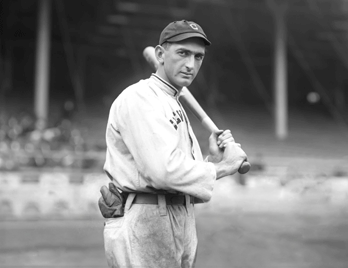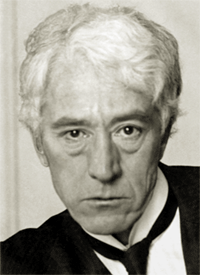|
Joe Jackson’s Rookie Bat
Answer
to Name
This Famous Antique Game - December 2016
By Mike McLeod

This is Joe Jackson’s game-used rookie bat that sold for $956,000 at Heritage Auctions in 2014. In 1911 in his first full year in the big leagues, he hit .408. Over his career, Jackson’s batting average was .356 with 1,772 hits and 785 RBIs.
|

Joe’s rookie bat (Photo courtesy of Heritage Auctions, HA.com)
|
Reportedly, “Shoeless Joe” Jackson got his nickname while playing in a mill baseball game. In those days, the mills fielded teams to play against one another. A new pair of shoes made Joe’s feet sore so he took them off before going to bat. Running the bases in his socks, a fan called out, “You shoeless sonofagun you!” After that, Joe always wore shoes.1
|

|
“Shoeless Joe” Jackson
|
Joe Jackson’s other famous bat, Black Betsy, sold for $537,750 at Heritage Auctions in 2011. When he was 15 years old and playing for a mill team, a fan and bat carver created this 36-inch, 48-ounce bat for him from hickory. But hickory is white in color and Joe preferred black bats, so the carver used tobacco juice to stain it.2
|

Joe’s Black Betsy (Photo courtesy of Heritage Auctions, HA.com)
|
It is a tragedy that such a great player should forever be known for the Black Sox Scandal of 1919 and that his name is the one most often associated with it. The others in the “Black Sox Eight” were: Chick Gandil (the ringleader); Eddie Cicotte (a knuckleballer who led the league in wins that year; he lost two of the three games he pitched);Lefty Williams (the pitcher who lost all three games he pitched in, setting a record that still stands); Fred McMullin; Swede Risberg; Happy Felsch; and Buck Weaver. Joe Jackson did not attend the “planning meetings” for the fix, but Weaver did; however, he did not help throw the game. Even so, Weaver was banned from baseball because he did not report the conspiracy.
Gambling and fixing games were rife in those days;in addition to gamblers, players, managers and owners bet on games. The players in on the fix wanted $20,000, but in the end, most only received $5,000. Eddie Cicotte demanded $10,000 up front and got it. Joe Jackson turned down an offer of $10,000 but said he would do it for $20,000. He onlyreceived $5,000.
Chick Gandil was supposed to pay the Black Sox after each game but held out until the fourth game and only provided $5,000 for each; the other players thought he double crossed them. He later denied doing so even it is known that the gamblers did pay most of the bribe money promised. It is believed Gandil pocketed $35,000.3
The Cincinnati Reds ended up winning 5-3 in a rare best-of-nine World Series. Although some suspected the game had been fixed, it didn’t come to light until a year later when an investigation into another baseball game being fixed turned up evidence.
According to The Black Sox Trial: An Account by Douglas Linder, “The players faced charges of (1) conspiring to defraud the public, (2) conspiring to defraud Sox pitcher Ray Schalk, (3) conspiring to commit a confidence game, (4) conspiring to injure the business of the American League, and (5) conspiring to injure the business of Charles Comiskey [owner of the White Sox].”4
Notice that there were no charges for throwing thegames. That is because it was not illegal to do so.5
While all the players were acquitted of all charges, Joe Jackson admitted while testifying on the stand that he was given $5,000 to throw the World Series. He, Cicotte and Williamssigned confessions for immunitysaying they took money, but those confessions were “lost” until sometime after the trial.6 Even so, Joe Jackson maintained that he played the best he could.
|

|
Kenesaw Mountain Landis, the first
Commissioner of Baseball
|
Kenesaw Mountain Landis, a judge who was appointed to be the first Commissioner of Baseball because of the scandal, rendered a different judgment: “Regardless of the verdict of juries, no player who throws a ballgame, no player that undertakes or promises to throw a ballgame, no player that sits in conference with a bunch of crooked players and gamblers where the ways and means of throwing a game are discussed and does not promptly tell his club about it, will ever play professional baseball.”7
Last year, Baseball Commissioner Rob Manfred stated that Joe Jackson would not be reconsidered for reinstatement in baseball.8 The Hall of Fame is not run by Major League Baseball, but without a reinstatement, “Shoeless Joe” will not be inducted into it.
After the trial, Joe Jackson played baseball for semi-professional teams and did some managing. He owned a couple of businesses. He died on Dec. 5, 1951 of a heart attack at the age of 63.
Ted Carlton of Utah correctly identified Joe Jackson’s bat.
--------------------
1, 2 Chicago History Museum, “The Black Sox,” chicagohs.org/history/blacksox/joe1.html
3 Society for American Baseball Research, sabr.org, “Chick Gandil,” by Daniel Ginsburg.
4, 6, 7 Linder, Douglas, The Black Sox Trial: An Account, http://law2.umkc.edu.
5 Espn.com, “Say it ain't so ... for Joe and the Hall,” by Rob Neyer.
8 Espn.com, “MLB won't reinstate Shoeless Joe Jackson,” Sept. 1, 2015.
All photos not credited, public domain.
Credit: Wikipedia.org.
|